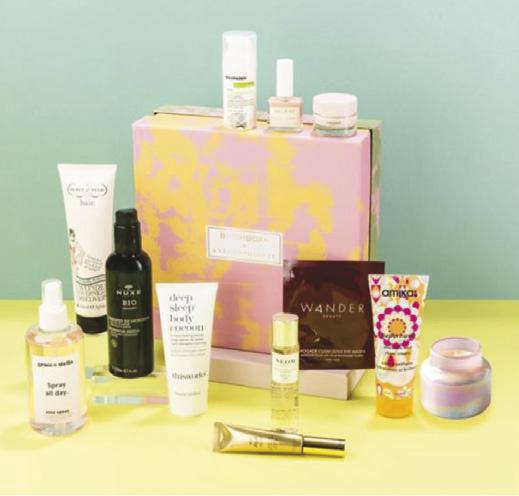
8 minute read
The subscription box economy – Valérie Kaminov

VALÉRIE KAMINOV – BIOGRAPHY Valérie Kaminov is Founder and Managing Director of the highly successful International Luxury Brand Consultancy. For over 25 years Valérie has been at the forefront of the global cosmetics industry and has worked with a vast array of luxury, premium and niche beauty brands and fragrances. With her extensive expertise, commercial acumen and practical experience IL Brand Consultancy has become one of the most sought after management and distribution agencies specialising in global beauty. Recognised for the breadth of business sectors and extensive distribution channels it works with, ILBC’s international client portfolio spans both well-established names and newly-emerging brands in hair care, make-up, skincare, fragrance, devices and top-to-toe brands. Valérie’s wealth of knowledge in international growth strategies and business development is combined with an inspirational and forward-thinking approach. Through her exceptional insight and understanding of the industry Valérie has helped brands amplify their market reach, elevate their brand presence, improve their business performance and achieve commercial success globally. A further aspect of her business is her skill in brand evaluation, acquisition due diligence, risk assessment and commercial growth which has led Valérie to regularly advise Private Equity Funds, multi-national organizations and financial investors. This capability in combination with her advanced qualifications and proficiency in corporate governance have made her a much-desired Board Advisor and Non-Executive Director. From her CEW mentoring, organisation of the International Manufacturers & Distributors Forum (IMF) and guest lecture programmes, Valérie is a passionate and dynamic advocate of the global beauty industry. Valérie splits her time between her London HQ and her central Paris office as well as managing a satellite network in China.
Advertisement
THE SUBSCRIPTION bOX ECONOMy:
Can beauty’s biggest comeback story retain its success post-pandemic?
Dubbed the most talked about trend of 2020 by Reddit UK, subscription boxes truly went boom in the year that most of the world went bust. Beauty box big hitters Birchbox saw a 150% increase in sales compared to 2019, E-commerce platform allsubscriptionboxes.co.uk reported it had received 173% more visitors in 2020 compared to the previous year and the Royal Mail reported that 15% of UK adults had ordered a subscription box since lockdown to ‘cheer themselves up through regular purchases’. The catalyst to these astronomical sales figures for a category that was, until recently, on the brink of collapse was, of course, a global lockdown. But as retail begins to open up and the need for letter box gifts wanes will subscription services be able to maintain momentum or will they be boxed up and left in the pandemic past?

Birchbox
Subscription boxes first hit the market more than 10 years ago and in that relatively short space of time the category has enjoyed both major successors and suffered extreme losses. In 2017, Royal Mail predicted that the subscription service category would hit £1bn in the UK by 2022, a 77% increase from 2017 but fast forward just two years and the category was on the down-turn. Pre- pandemic subscription services were suffering as a result of peak saturation within the beauty market, Birchbox cut 25% of its global staff, and FabFitFun around 18%. Sensitivity to market trends is the making or breaking of this unique category and the arrival of a global pandemic proved it to be the former as the subscription box formula of convenience, value for money plus the novelty of new products proved a hit with consumers’ new found dedication to self-care, and caring for others.
Why though, is the subscription box so much more appealing to consumers when they are stuck at home? Alex Valbona, President of EU, Birchbox thinks the answer lies in a trend that Birchbox predicted back in 2012, that of cocooning. “Recent circumstances have forced us to find refuge in the home and seek an environment in which we feel truly comfortable, a bolthole from an outside world we find increasingly hectic, aggressive and unpredictable. We’ve spent years preparing ourselves, and the coronavirus pandemic has simply accentuated a trend we already saw coming in 2012: that of cocooning, the growing tendency to leave the home less and less, enjoying more and more experiences within its four walls.”.
Aside from the human desire to create a safe and comforting space there are other factors which have exacerbated the subscription box acceleration. Firstly, there’s the convenience of delivery and the fact that the easy replenishment options offered by many subscription services means that consumers don’t have to forgo their favourite products. Additionally, “the boom in online shopping and the difficulties in trying out cosmetics in situ, due to safety and hygiene measures, meant that e-commerce can only go from strength to strength, both as a first option for discovering makeup, face, body and hair care products and - as with our subscription model - for trying them out in the safety of one’s own home, for later purchase” says Valbona. For many, the pandemic has encouraged them to make first time purchases of products they wouldn’t usually buy, Zalando, Europe’s largest fashion and lifestyle e-commerce marketplace, reported a boom in pampering and self-care beauty categories, including candles, aromatherapy, and detox products; sales of skin, nail, and hair-care products were up 300 percent, year on year*. As well as providing an opportunity for self-care, consumers also subscribed so that they could have something to look forward to that would break up the monotony of isolating. Royal Mail reported that 15% of UK adults had ordered a subscription box since lockdown to ‘cheer themselves up through regular purchases’. And, an increase in sending gifts was also a major contributor to subscription box sign ups, “people want to find original gifts that feel personalised for the individual. Lockdown has accelerated this trend with peaks such as Easter and Father’s Day seeing volumes almost double last year. They are easy to find online where people are browsing and looking for gift ideas” said DPD Chief Executive, Dwain McDonald.
However, despite *ahem* unprecedented sales spikes over the past year, subscription services still have major barriers to overcome to both retain customers and to move the needle among nonparticipants. While there are more subscribers than last year consumer adoption remains relatively low, with only just over a third of consumers currently participating in at least one service noted a recent Mintel survey. Key stumbling blocks for subscription services to overcome include addressing negative perceptions about the value proposition and ‘contract’ terms with an out clause revealed the survey. The novelty factor of receiving new products is also something that can wear thin relatively quickly, “I think that the biggest ongoing challenge is the necessity to delight customers continuously every month with a new concept,” says Michael Maarek, founder of allsubscriptionboxes.co.uk, who says successful subscription-box brands tend to create a (virtual) community for subscribers and “build a brand proposition that goes beyond the contents of each box”.



Causebox
Although there are clear challenges for brands to contend with if they want to tick a consumers subscription service boxes there is still plenty of opportunity to become a key player within this unique sector. “Changes in people’s lifestyles as a result of the COVID-19 pandemic and the lockdowns have affected usage habits and led to major shifts in the types of beauty and personal care products consumers are buying. One of the big opportunities is for brands to focus on in- home beauty treatments and DIY kits that allow people to improve their skin and appearance within the comfort of their homes, whilst also catering to growing demand for self-care. There is scope to drive purchasing in the worst-hit categories such as fragrances through extensions with other categories such as personal care and household which have been less impacted by the pandemic” says Tamara Sender Ceron, Senior Consumer Analyst. Brands looking to opt in to the subscription model should be boosted by the fact that this offering is an easy way to provide regular product replenishment, convenience and sustainability.
A subscription service enables brands to align themselves with key consumer values including sustainability, inclusivity and economic viability. Causebox is a lifestyle and wellness box that sustainably sources all its products locally or from artisans, putting a focus on transparency. Meanwhile, the fragrance subscription service Scentbird gives consumers the opportunity to experience luxury fragrances before making an expensive commitment, thus appealing to both the value-driven and sustainably minded consumer, as it reduces the risk of a perfume going to waste. Annie Johnston, Beauty Analyst at trend forecasters WGSN recommends that “brands looking to launch into this growing category should design curated selection around sustainability, modern wellness and inclusivity.”. The nature of a replenishment model is at odds with the growing call from consumers for brands to limit waste. With this in mind brands must adopt innovative sustainable strategies to ensure their success; Beautiac for example is a makeup brush brand which has partnered with Terracycle to recycle old brush heads into park benches.
Collaborations and co-curations with other brands, influencers and industry experts is another way that brands can explore subscriptions services and get their products into the hands of a wider demographic. Allure regularly works with influencers to co-curate editions of its box, including Huda Kattan and Zoe Kravitz. These drove a 400% higher conversion than other months, said VP of marketing for Condé Nast Beauty. Consider partnerships beyond the beauty realm to entice a new audience or team up with a charity to enable your brand to join the political and social activism conversation. While the pandemic has created huge opportunities for the growth of subscription services brands will need to carefully consider how appealing subscriptions will continue to be as consumers emerge from the cocoons of their homes with a renewed sense of economic caution. Success can still very much be a possibility though, if brands are prepared to think outside the box.
ScentBird







